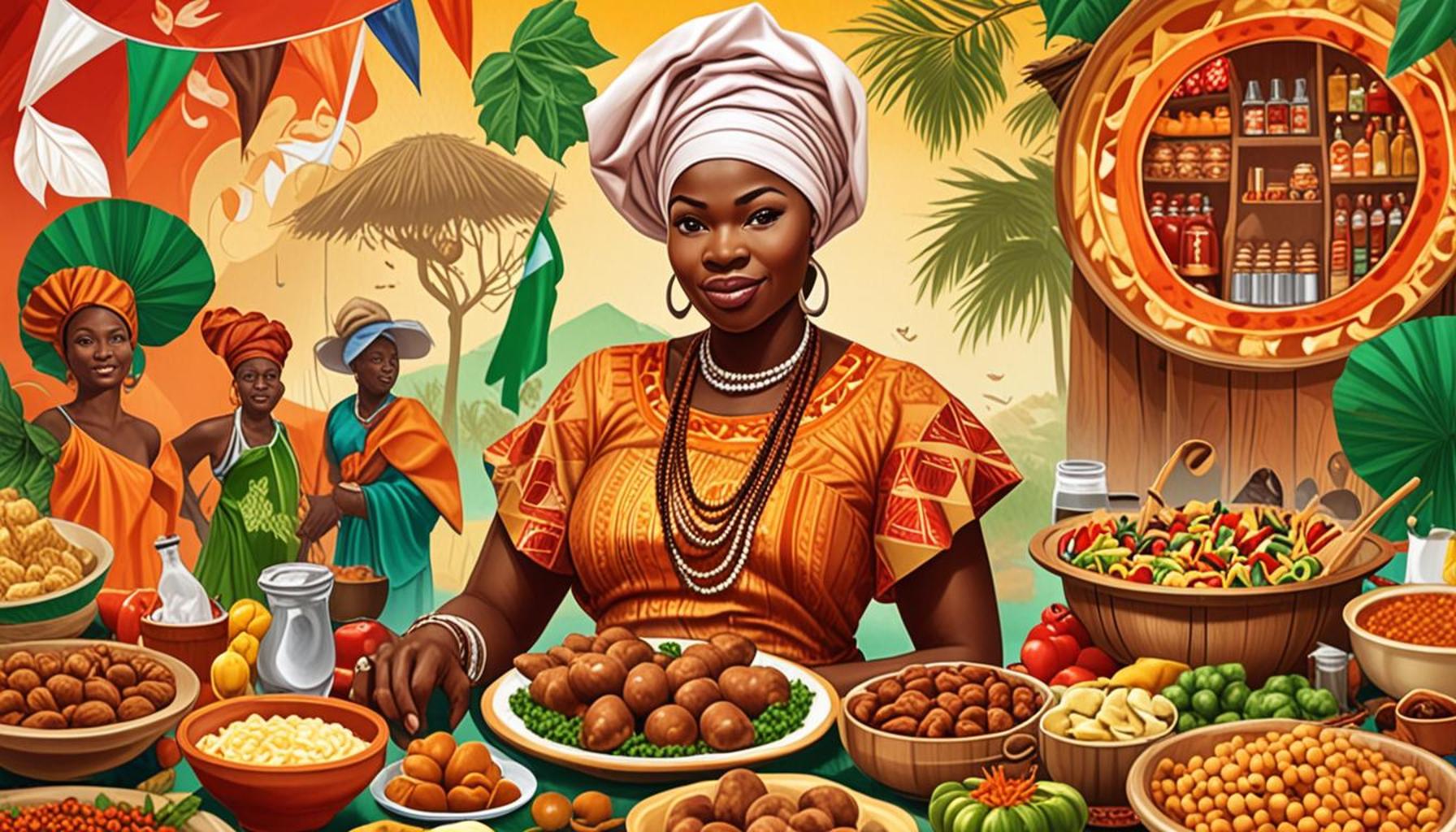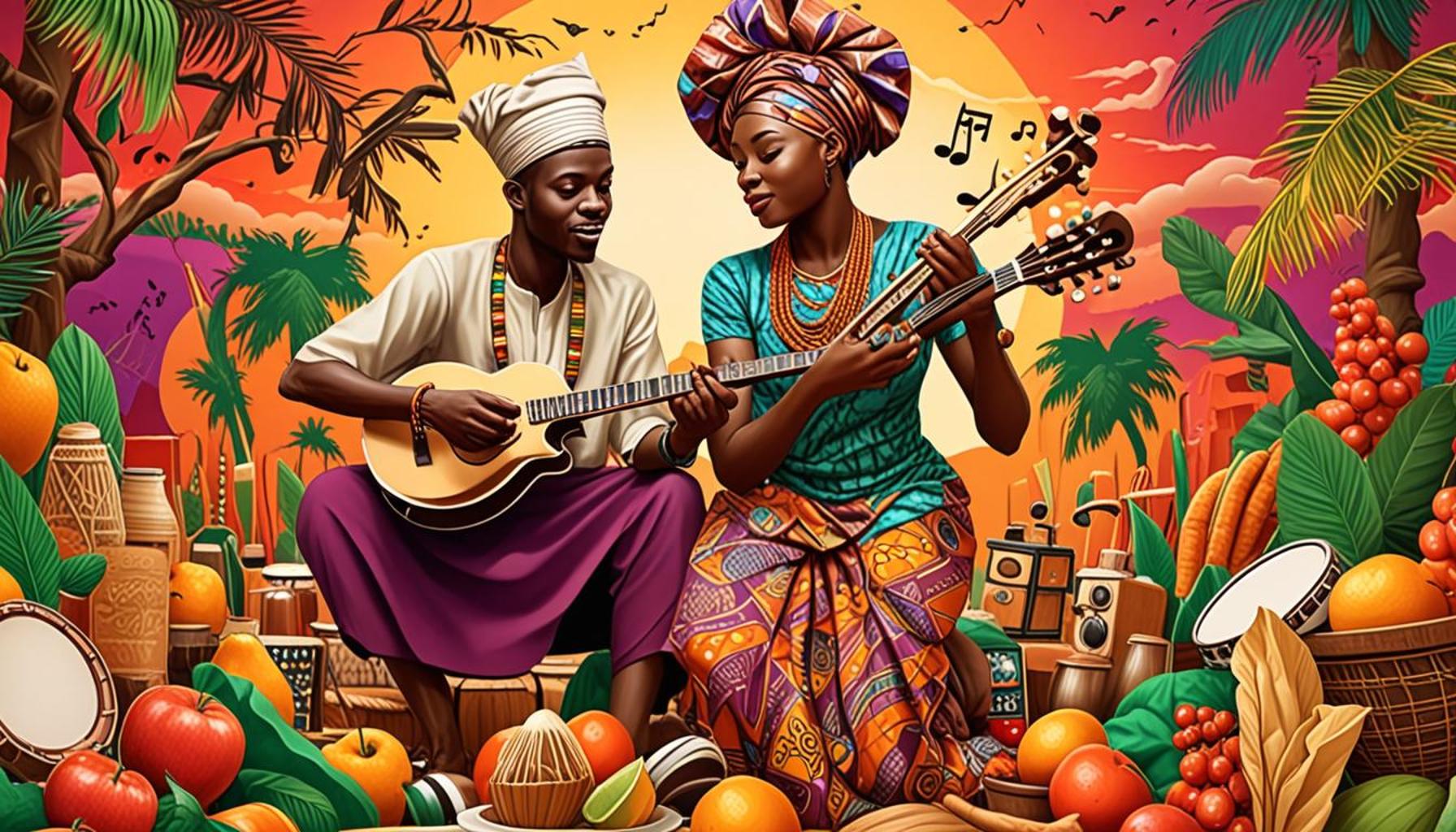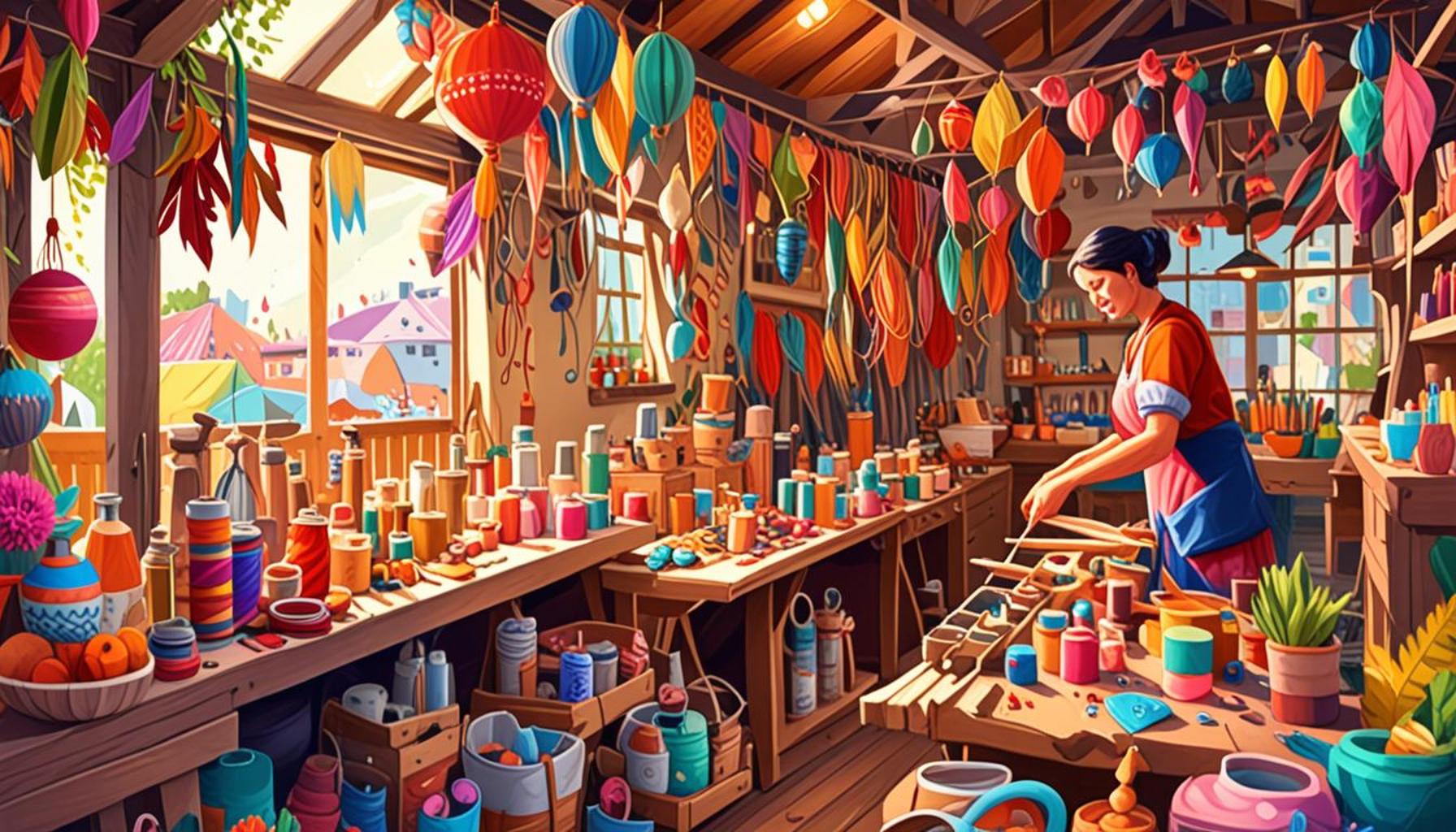Flavors and Festivals: Culinary Itineraries that Reveal Nigerian Culture

Nigeria’s Culinary Treasures: A Taste of Heritage
Nigeria is a land rich with cultural diversity, and its culinary landscape is no exception. Each region boasts unique flavors, ingredients, and culinary traditions that reflect the vibrant heritage of its people. From the bustling markets of Lagos to the serene villages of Enugu, food serves as a vital connection to identity and community. A vibrant array of local spices, herbs, and cooking methods have shaped a culinary tradition where every meal tells a story.
Why Culinary Itineraries Matter
Embarking on a culinary journey through Nigeria offers more than just a taste of its food. It reveals:
- Tradition: Recipes passed down through generations are integral to understanding the cultural fabric of Nigeria. For instance, the preparation of Ogbono soup, often made with ground ogbono seeds, is not just a meal but a ritual steeped in the history of the Ibo people.
- Community: Festivals that unite families and friends around food create a deep sense of belonging. The Durbar Festival in Kano showcases traditional horse riding and vibrant local dishes, making it an important cultural gathering.
- Diversity: A mélange of flavors from various ethnic groups is celebrated through different cooking styles. Northerners may favor dishes like Tuwo Shinkafa, a rice flour dish often served with spicy sauces, while southern regions might offer the spicy and comforting Pepper Soup.
Every festival provides a unique opportunity to experience local dishes. Picture yourself savoring:
- Jollof rice at a wedding feast in Abuja, where families compete for the title of best jollof; it’s a national obsession.
- Pounded yam and egusi soup during the New Yam Festival in Enugu, a significant celebration that marks the harvest of yams and the start of new culinary delights.
- Suya from street vendors at the Lagos Street Food Festival, where skewered spicy meat is not just a meal but an experience to relish under the city’s vibrant night sky.
These culinary itineraries not only tantalize the taste buds but also immerse you in the stories and traditions that shape Nigerian culture. In urban settings, communal cooking and sharing of meals highlight the emphasis on togetherness, while rural cuisine fosters a connection to the land and local agricultural practices. Discover how food festivals celebrate the rich tapestry of Nigeria’s heritage, inviting you to experience flavors that are as varied as its people. Each dish is not merely sustenance; it is a gateway into Nigeria’s past, present, and future.
ADDITIONAL INSIGHTS: Expand your understanding here
Exploring Regional Delicacies Through Festivals
Nigeria is divided into several regions, each enriched with its own culinary treasures that reflect the local customs and agricultural abundance. Each festival tied to these regions showcases an authentic taste of its unique heritage, providing an extraordinary opportunity for food lovers to delve into the heart of Nigerian culture. Below are just a few of the remarkable festivals offering a feast for the senses while celebrating regional flavors:
The New Yam Festival
Primarily celebrated by the Ibo people in southeastern Nigeria, the New Yam Festival, or “Iwa ji”, is a vibrant celebration that marks the end of the harvest season. Traditionally occurring in August, this festival is not just a time for feasting but also a sacred occasion. During the event, families gather to prepare traditional dishes featuring yam, the star ingredient. The sumptuous pounded yam paired with egusi soup highlights local culinary skills and is prepared with love and care, symbolizing abundance and prosperity. This festival is steeped in ritual; it begins with the ceremonial offering of the first yam to the gods, acknowledging the vital role agriculture and respect for the land play in Ibo society.
The Lagos Street Food Festival
If you wish to dive into the urban cuisine of Nigeria, the Lagos Street Food Festival is a must-visit. This vibrant festival allows attendees to sample an array of dishes from different street vendors, showcasing the dynamic flavors that define Lagos. From the famed Suya, a spicy, grilled meat skewer often accompanied by sliced onions and tomatoes, to Moi Moi, a savory bean pudding, visitors can experience the delightful fusion of flavors created through years of culinary evolution. The festival elevates street food, celebrating the diverse culinary traditions that thrive in Nigeria’s most populous city while bringing people together in a joyous environment.
The Eyo Festival
Renowned for its visual splendor, the Eyo Festival, held in Lagos, is a unique cultural celebration that dates back to the 19th century. The festival pays homage to the departed, celebrating their lives with music, dance, and culinary offerings. Traditional dishes, including Jollof rice, are served abundant and hot to all attendees. The competition among families to prepare the best Jollof is fierce, leading to many spirited debates about which recipe reigns supreme. Here, food is more than a meal—it embodies community heritage, respect, and the bonds formed over shared culinary experiences.
These festivals highlight the deep connection between food and culture in Nigeria. The regional flavors encountered during these celebrations are a testament to the diversity that runs through the land. Whether you are enjoying a bowl of Ogbono soup at a village gathering or relishing spicy fish stew by the coast, every bite unravels the layers of a rich history intertwined with social connections and deep-rooted traditions. As we further explore the intersection of flavors and festivities across Nigeria, the stories told through these culinary itineraries will invite you to taste and experience the essence of Nigerian culture.
| Culinary Experience | Cultural Insights |
|---|---|
| Diverse Cuisine | Explore rich flavors like Jollof rice, Pounded Yam, and Suya. |
| Festive Celebrations | Participate in vibrant festivals showcasing culinary heritage. |
Discovering the flavors and festivals of Nigeria offers an enticing journey through culinary itineraries that reflect the nation’s culture. Each meal is a taste of history, bringing forth spices and techniques passed down through generations. You may find an immense variety of local ingredients, from the spicy pepper sauces to the heartwarming stews that characterize Nigerian cuisine.Events such as the Jollof Festival and the Ongoing Cultural Festivals provide an immersive experience where you can savor iconic dishes while understanding their significance in Nigerian society. These gatherings not only celebrate food but foster community and cultural pride. Traditions tied to local ingredients, cooking methods, and communal meals paint a vivid picture of Nigeria’s rich heritage.As you delve deeper into these culinary experiences, you may also uncover new recipes, local cooking classes, and opportunities to interact with chefs and home cooks eager to share their stories and techniques. Each dish tells a story, enriching your understanding of what it means to be part of Nigeria’s vibrant culture.
LEARN MORE: This related article may interest you
Indigenous Cooking Techniques and Their Celebrations
Nigerian festivals are not only showcases of vibrant culture and traditions but also opportunities to celebrate indigenous cooking techniques that have been passed down through generations. These methods often involve a blend of local spices, traditional cooking implements, and communal preparation, creating a unique gastronomic experience for festival attendees. Here, we dive into some festivals that prominently feature these remarkable culinary practices:
The Calabar Carnival
Known as Africa’s biggest street party, the Calabar Carnival is a month-long celebration in Cross River State that attracts both locals and international tourists. It occurs every December and is a lively display of dance, music, and food. The culinary aspect shines as festival-goers indulge in local flavors such as afang soup and ekpang nkukwo, a deliciously rich dish made with cocoyam and leafy vegetables. Traditional cooking techniques, such as steaming wrapped in leaves and slow-cooking in earthen pots, retain the flavors of these authentic dishes, taking diners on a sensory journey through the region’s culinary heritage. The blending of cooking styles and flavors reflects the multicultural nature of Calabar, where indigenous practices meet influences from various ethnic groups.
The Osun-Osogbo Festival
Celebrated annually in Osogbo, the Osun-Osogbo Festival honors the river goddess Osun, promoting cultural identity and connectivity among the Yoruba people. One key feature is the communal feast that takes place alongside the rituals. Foods such as iyan (pounded yam) and stewed goat meat highlight traditional preparation methods that utilize local ingredients in a communal setting. The festival not only serves to preserve and promote the culture of the Osun community but also stresses the importance of the ingredients, often sourced directly from the local riverbanks where Osun is believed to bless the land. Traditional pot cooking, open flames, and the collective spirit of preparation transform the act of cooking into a celebration of community.
The Ekiti Food Festival
The Ekiti Food Festival, held annually in the southwest, unveils the region’s hidden culinary gems while promoting local tourism and agriculture. This festival emphasizes the importance of indigenous ingredients such as gbodo (African nutmeg) and almond, which are often used in traditional dishes like ekiti rice and panla fish pepper soup. Here, chefs showcase not just their cooking skills but also their knowledge of traditional methods such as smoking, drying, and fermenting various ingredients, which add depth and complexity to flavors. Attendees can participate in workshops and demonstrations, making it an interactive experience that educates visitors about the connection between food, farming, and health while celebrating the culinary heritage of the Ekiti people.
These festivals are remarkable examples of how Nigerian culture is inherently tied to its culinary practices. The flavors experienced during these events reveal stories of resilience, history, and creativity, inviting locals and tourists alike to partake in an engaging cultural exchange. As participants indulge in these authentic dishes, they not only satisfy their taste buds but also embrace the vibrant legacies and traditions that continue to define Nigeria’s diverse cultural landscape.
CHECK OUT: Click here to explore more
Conclusion: A Flavorful Tapestry of Cultural Heritage
As we explore the rich tapestry of Nigerian culture through its culinary itineraries, it becomes evident that flavors and festivals play an integral role in weaving a narrative that celebrates community, heritage, and identity. From the vibrant streets of the Calabar Carnival to the spiritually significant Osun-Osogbo Festival, and the delightful Ekiti Food Festival, every event comes alive with the essence of Nigeria’s diverse ethnic groups and their unique culinary practices.
Nigerian festivals not only emphasize traditional cooking techniques that are often conducted communally, but they also serve as educational platforms that advocate for local agriculture and the appreciation of indigenous ingredients. As festival-goers indulge in traditional dishes, they partake in a shared history that transcends generations, ensuring the survival of culinary arts that are deeply rooted in the country’s cultural paradigm. Whether it’s the deep aroma of spicy suya, the complex flavor profiles of jollof rice, or the comforting warmth of pepper soup, these dishes tell unique stories that connect the past with the present.
In recognizing the importance of these festivals, we invite both locals and international visitors to embark on a culinary journey that reveals the heart of Nigeria’s heritage. The stories told through flavor transcend mere sustenance, transforming meals into vibrant experiences that celebrate unity, creativity, and personal connection to the land. By immersing ourselves in these cultural bundles wrapped in spices, we are not just tasting food; we are experiencing the soul of Nigeria.


